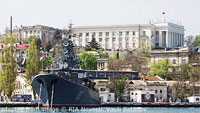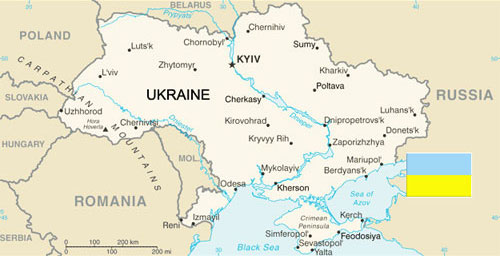The Kremlin’s Euromaidan Calculus

(Institute of Modern Russia – imrussia.org – Donald N. Jensen – January 6, 2014)
In December, after a meeting between Vladimir Putin and Viktor Yanukovych, Moscow announced that it would give Kiev a $15 billion bailout and slash the gas price by one-third as a reward for Yanukovych’s rejection of an association agreement with the European Union. Donald N. Jensen, Resident Fellow at the Center for Transatlantic Relations at the Johns Hopkins School of Advanced International Studies, suggests that the coming year will show whether Ukraine now really belongs to Vladimir Putin.
Disappointingly, but perhaps unsurprisingly, the Kremlin’s hearty geopolitical borschta blend of money; political support to bolster Yanukovych’s wavering political base; and cover for the latter’s theft, bullying, and violenceproved more attractive to the Ukrainian leader than the blander soup of eventual rule of law, free trade, competition, and reform offered by the European Union.
“Ukraine is our strategic partner and ally in every sense of the word,” Putin animatedly declared at a press conference after the announcement, with Yanukovych sitting stiffly next to him in an ornate Kremlin hall. “This [assistance] is not tied to any conditions,” he added less convincingly. “I want to calm you down. We have not discussed the issue of Ukraine’s accession to the Customs Union [an important step toward more formal integration of the two countries] at all.” Months of intense negotiations with the European Union had created widespread expectations among most Ukrainians of closer ties with those states, and consequently Yanukovych’s decision to walk away from a deal with Brussels in late November sparked demonstrations in Kiev and other Ukrainian cities. Within hours after the deal with Moscow was announced, thousands of additional protesters reinforced the barricades near the Maidan in central Kiev, accusing Yanukovych of selling his country off to the highest bidder.
Despite the satisfaction of having stopped Ukraine’s deal with the European Union, it is unclear what concrete results Putin will get for his investment in the short term. Some press reports suggest there is a secret agreement to bolster Russia’s Black Sea Fleet, now anchored in Ukrainian waters. Opposition leader Vitaliy Klitschko has expressed concern that strategic Ukrainian facilities are the collateral of the deal with Moscow (Gazprom has long been interested in acquiring Ukraine’s gas pipeline system). Still other reports surmise that Yanukovych has quietly already agreed to join the Customs Union despite Putin’s public denial. In any event, Putin seems to be drawing Ukraine toward Russia deliberately but carefully. He wants to make sure, for example, that the loan to Kiev, drawn from the National Welfare Fund created to help Russia’s pension problems, is not wasted. (This part of the deal likely is illegal, since Russian law specifies which kinds of bonds can be purchased with fund money, and Ukrainian debt does not fall into any of these categories.) Given the catastrophic state of the Ukrainian economy, Yanukovych’s uncertain political future, and the fact that Russia’s own economy is stalling, Putin also made sure the gas price reduction will be reviewed quarterly.
The reaction to the deal in Russia was mixed. Political experts polled by RIA Novosti saw some benefits for Russia in the agreement with Ukraine, but they concluded they were insufficient and expected additional concessions from Kiev. Some experts questioned Yanukovych’s sincerity and wondered whether he would switch course again if he got a better offer from Brussels. One prominent investment analyst predicted that the new lower price would result in Gazprom losing billions of dollars.
Putin cut a deal with Yanukovych, however, for reasons far more fundamental than likely, though risky, short-term economic and political advantage. At his annual end-of-year press conference on December 19, Putin stated, “We very often use the term ‘brother nation’ or ‘sister nation.’ . . . We see that the current situation, both political and economic, is quite difficult. So if we say [Ukraine] is a sister nation, we should do what family members do. We should support our sister nation when in dire straits. This is the number one reason why this decision was taken”. A more telling indicator of Moscow’s long-term intentions, however, is reflected by the boast of an anonymous Kremlin official to a Kommersant reporter two days before that: “They are now ours.”
Indeed, in the past Putin has publicly stated his dubious belief, shared by many members of the Russian elite, that Ukraine is not a real country at all. Ukraine (and Belarus) are closely bound to Russia by a common history, culture, and religion. Ukrainians, in Putin’s view, are “little Russians”that is, a branch of the Russian people. Putin thus seems to believe that the 2004 Orange Revolution could not have actually been the work of “real” Ukrainians, but was the result of Western meddling. The later collapse of the Orange Revolution was as significant to Putin as its occurrence, James Sherr has rightly pointed out, since it seemed to vindicate his conviction about the distinctiveness of the former Soviet space and its unsuitability for Western-style democracy.
These ties, which, according to Russia’s leaders, take precedence over international law, provide the Kremlin with a rationale for the kind of pressure Moscow has put on Kiev in recent months. First, while Russia respects in principle the sovereignty of its neighbors, its leaders believe they can define what that sovereignty means in practice (in Ukraine’s case, that that country is little more than an adjunct of the Russian Federation where Moscow has “privileged interests”). Second, the Kremlin’s attempt to bring Ukraine back into its orbit poses an ideological challenge to Western liberal democracies. For the West, the basis of legitimacy is popular consent. For Russia, the basis for legitimacyat least in the case of Ukraineis history. In Putin’s view, the historical choice of the Russian people in favor of unity has been confirmed again and againnot by plebiscites or referendums, but by blood (i.e., by identity). This identity is to him more important than any choice by the Ukrainian citizens (the majority of whom, according to reliable polls, favor the EU association agreement.)
Putin also pushed for a deal to restore Russia’s influence in the former Soviet space more generally. As Dmitry Trenin of the Carnegie Moscow Center argues, Russia’s foreign policy is based on the view that international relations are highly competitive, with several power centersincluding the United States, the European Union, and Chinavying for influence. Putin has sought to construct an association of Eurasian states as a counterweight to Western dominance of global institutions. Since he formally returned to the presidency, moreover, Putin has added a normative dimension to this campaign by portraying Russia as the global champion of conservative values against an increasingly decadent West. The pillars of this drive are not only “family values” and religious faith, but also national sovereignty and noninterference in the internal affairs of other states (unless, of course, the Kremlin decides otherwise). There is no doubt that, psychologically and practically, the crown jewel of Putin’s would-be empire is Ukraine.
Finally, Putin’s illiberal empire helps the Kremlin counter “dangerous” Western values, such as those taking root, though unevenly, in Ukraine. If spread to Russia, these ideas could threaten the ruling elite’s monopoly on power. In his December press conference, Putin said that street protests such as those in Ukraine would not be tolerated in Russia. It is a reflection of the Kremlin’s nervousness about events in Ukraine, moreover, that throughout the Kiev protests, Russia’s state-controlled media has broadcast blistering anti-Ukraine propaganda, inventing stories of fascist tendencies in western Ukraine, where pro-EU sentiment is strong, and raising the possibility of splitting the country in half, though there is no mention of such an idea on the ground. At a meeting of the Moscow-dominated Collective Security Treaty Organization (CSTO) Secretariat in Moscow on December 16, representatives discussed how to deter so-called “color revolutions.” Topics included “foreign interference mechanisms and provocation patterns,” “the possible ways of financing sociological destabilization schemes,” and the role of “nongovernmental organizations, the media, the Internet, social networking services and blogging in sociopolitical destabilization attempts.”
Moscow now has a financial hold on Ukraine. If Putin withdraws Russia’s money or raises the gas price, the Ukrainian economy and government could collapse. Even the current agreement, moreover, is likely to be no more than a bandage for Ukraine’s economic difficulties. The risk of default over the next twelve months still looms. Yanukovych’s priorities now are to reform the economy, defuse the opposition, and ready his presidential bid for February 2015, though the cushion of Russian aid is likely to push the more unpopular reforms to the back burner. The past decade of popular revolts against authoritarian regimes throughout Eurasia has repeatedly demonstrated the dangers posed by elections, even rigged ones, to corrupt, unpopular leaders. 2015 is likely to test the lengths to which Putin is prepared to go to prove that the Ukrainians are really his.
Article also appeared at http://imrussia.org/russia-and-the-world/634-the-kremlins-euromaidan-calculus bearing the following notice:

